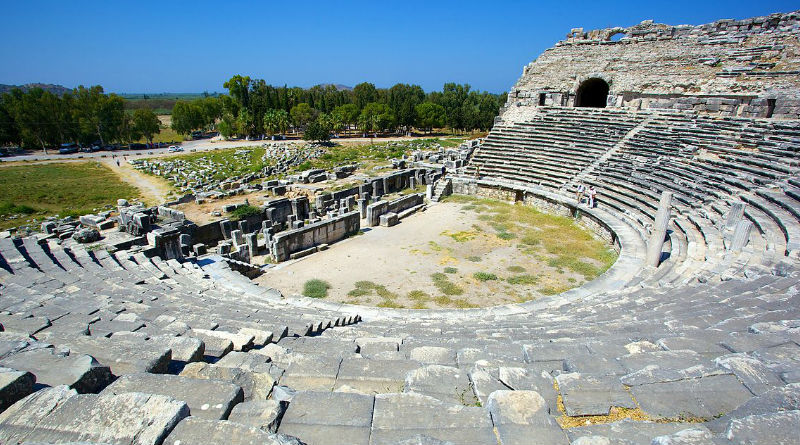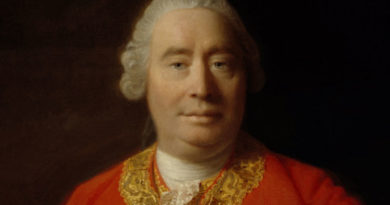Three Philosophers From Miletus
Posted on 11 December 2019
Miletus, a Greek colony in Asia Minor on the coast of modern-day Turkey, was the birthplace of three Natural Philosophers.
These three Natural Philosophers were Thales, Anaximene and Anaximander. They introduced new opinions, contrary to the then prevailing views, on how the world was organized. Without using the gods as an explanation, they presented a view of nature in terms of observations and methods. Therefore, they represented one of the first unified attempts to make philosophy truly scientific.
Thales

Often described as the first ever scientist, Thales was born about 624 or 625 BC.
He traveled in many countries, including Egypt, where he is said to have calculated the height of a pyramid by measuring its shadow at the precise moment when the length of his own shadow was equal to his height.
He is also said to have accurately predicted a solar eclipse in the year 585 BC.
Thales thought that the source of all things was water. He claimed that water was that from which all things emerge and to which they return, and moreover that all things ultimately are water. So everything starts as water and eventually dissolves back into water.
For Thales, water was the Root of all Change.
He probably drew this conclusion from seeing moist substances turn into air, slime and earth. He believed that the Earth was created from solidifying the water upon which it floated.
During his travels in Egypt he most likely observed how the crops began to grow as soon as the floods of the Nile receded from the land areas in the Nile Delta. Perhaps he also noticed that frogs and worms appeared whenever it had just been raining.
It is likely that Thales thought about the way water turns to ice or vapor and then turns back into water again. Thales is also supposed to have said that ‘all things are full of gods’. What he meant by this is open to interpretation but he did believe that the earth was filled with tiny invisible ‘life-germs.’
One thing is certain – he was not talking about Homer’s gods.
Thales is said to have died of dehydration while watching a gymnastics contest in 546 or 547 BC, at the age of 78, although other evidence reports him living to the age of 90.
“The most difficult thing in life is to know yourself.”
“Nothing is more active than thought, for it travels over the universe, and nothing is stronger than necessity for all must submit to it.”
“Who is happy? This is a person, who has a healthy body, is dowered with peace of mind and cultivates his talents.”
Thales
Anaximenes

The second notable philosopher from Miletus was Anaximenes (c. 570 – 526 BC). He thought that the source of all things must be ‘air’ or ‘vapor.’ Anaximenes was familiar with Thales’ theory of water.
But where does water come from?
Anaximenes thought that water was condensed air, believing that when it rains water is pressed from the air. When water is pressed even more, it becomes earth, he concluded.
He may have seen how earth and sand were pressed out of melting ice. He also thought that fire was rarefied air. According to Anaximenes, air was therefore the origin of earth, water, and fire.
For Anaximenes air was the Root of all Change.
Perhaps Anaximenes thought that earth, air, and fire were all necessary to the creation of life, but that the source of all things was air or vapor. So, like Thales, he thought that there must be an underlying substance that is the source of all natural change.
“The mighty main sea is the begetter of clouds and winds and rivers.”
Anaximenes
Anaximander

Arguably, the grearest philospher of the Milesian philosophers is Anaximander (c. 610 – 546 BC), who was a student of Thales.
He is often considered the founder of astronomy. He tried to observe and explain different aspects of the universe and its origins, and to describe the mechanics of celestial bodies in relation to the Earth.
Whereas his teacher, Thales, had believed that water was the single source of all things, Anaximander argued that although not directly perceptible to us, the only substance which could explain the sheer variety of nature is something he called the Boundless.
For Anaximander, the Boundless was an endless, unlimited primordial mass, subject to neither old age nor decay, that perpetually yielded fresh materials from which everything we perceive is derived.
According to Anaximander , the universe originates in the separation of opposites in this primordial matter, and dying things are merely returning to the boundless element from which they came. He saw the universe as a kind of organism, supported by ‘pneuma’, meaning cosmic breath.
He also thought that our world was only one of a myriad of worlds that evolve and dissolve into the Boundless.
For Anaximander, the Boundless was the Root of all Change.
“The source from which existing things derive their existence is also that to which they return at their destruction.”
“There are many worlds and many systems of universes existing all at the same time, all of them perishable.”
Anaximander
So three philosophers had come up with three very different ideas about how life was created on Earth, but who would be proved right?
Images from various sources





